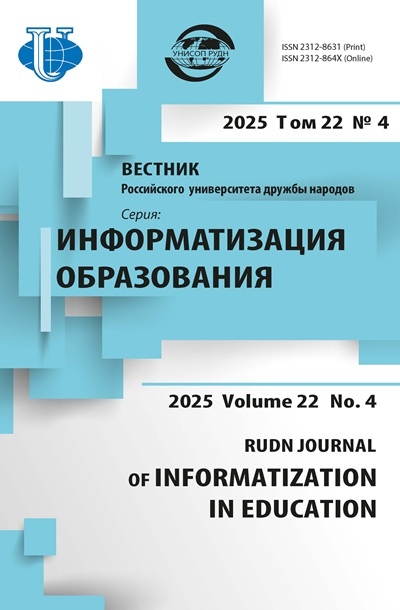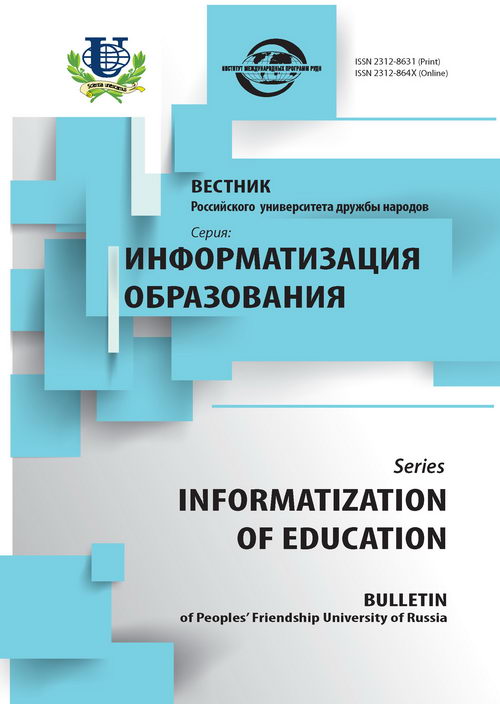О повышении мотивации финских учителей к применению информационных и коммуникационных технологий
- Авторы: Лавонен Яри -1
-
Учреждения:
- Департамент педагогического образования Университета Хельсинки
- Выпуск: № 1 (2014)
- Страницы: 5-15
- Раздел: СТАТЬИ
- URL: https://journals.rudn.ru/informatization-education/article/view/7058
- ID: 7058
Цитировать
Полный текст
Аннотация
Целью данной статьи является анализ подходов к повышению мотивации финских учителей к использованию информационно-коммуникационных технологий (ИКТ) в обучении. Статья основана на собственных результатах исследований автора и коллег. В статье описывается ситуация в финской системе образования и финская модель школьного обучения. Кроме этого, описываются стратегические подходы к развитию системы подготовки и переподготовки учителей в контексте использования ИКТ. Наконец, дается оценка результатов 25-летнего опыта использования ИКТ в образовании. Большинство приводимых в статье примеров представлено в контексте естественно-научного образования.
Об авторах
- Лавонен Яри
Департамент педагогического образования Университета Хельсинки
Email: jari.lavonen@helsinki.fi
Список литературы
- Ahtee M., Pehkonen E. (Eds.). (1997). Matemaattisten aineiden opettajien täydennyskoulutuksesta. [In-service training of mathematics, physics and chemistry teachers.] Tutkimuksia 173. — Helsinki, Finland: University of Helsinki, Department of Teacher Education.
- Bransford J.D., & National Research Council (U.S.). (2000). How people learn: Brain, mind, experience, and school. — Washington, D.C.: National Academy Press.
- Deci E.L., Ryan, R.M. (2004). Handbook of Self-determination Research. Rochester, NY: The University of Rochester Press.
- European Commission. (2013) Survey of Schools: ICT in Education Benchmarking Access, Use and Attitudes to Technology in Europe’s Schools. European Commission — IP/13/341 19/04/2013
- Fullan M. (2007). The New Meaning of Educational Change (4th ed.). New York, NY: Teachers College Press.
- Jakku-Sihvonen R., Niemi H. (Eds.). (2006). Research-based teacher education in Finland: Reflections by Finnish teacher educators (Research in Educational Sciences 25). — Turku, Finland: Finnish Educational Research Association.
- Juuti K. (2005). Towards primary schools physics teaching and learning: Design research approach (Research Report 256). — Helsinki, Finland: University of Helsinki, Department of Applied Sciences of Education.
- Kim M., Lavonen J., Juuti K., Holbrook J., Rannikmäe M. (2012). Teacher’s reflection of inquiry teaching in Finland before and during an in-service program: Examination by a progress model of collaborative reflection // International Journal of Science and Mathematics Education, 11(2), 359—383.
- Lavonen J., Aksela M., Juuti K., Meisalo V. (2003). Designing user-friendly datalogging for chemical education through factor analysis of teacher evaluations // International Journal of Science Education, 25(12), 1471—1487.
- Lavonen J., Juuti K., Aksela M., Meisalo V. (2006). A professional development project for improving the use of information and communication technologies in science teaching // Technology, Pedagogy and Education, 15(2), 159—174.
- Lavonen J., Krzywacki-Vainio H., Aksela M., Krokfors L., Oikkonen J., Saarikko H. (2007). Pre-service teacher education in chemistry, mathematics and physics / In E. Pehkonen, M. Ahtee, J. Lavonen (Eds.) // How Finns learn mathematics and science (pp. 49—67). — Rotterdam, Netherlands: Sense Publishers.
- Lavonen J., Krzywacki H., Koistinen L., Welzel-Breuer M., Erb R. (2012). In-service teacher education course module design focusing on usability of ICT applications in science education // Nordina, 8(2), 138—149.
- Löfström E., Nevgi A. (2007). From strategic planning to meaningful learning: diverse perspectives on the development of web-based teaching and learning in higher education // British Journal of Educational Technology, 38(2), 312—324.
- Meisalo V., Lavonen J., Juuti K., Aksela M. (2007). Information and communication technology in school science in Finland / In E. Pehkonen, M. Ahtee, & J. Lavonen (Eds.) // How Finns learn mathematics and science (pp. 68—85). — Rotterdam, Netherlands: Sense Publishers.
- Meisalo V., Lavonen J., Sormunen K., Vesisenaho M. (2010). ICT in Finnish initial teacher education: Country report for the OECD/CERI New Millennium Learners Project ICT in Initial Teacher Training (Reports of the Ministry of Education and Culture, Finland; 2010:25). — Helsinki, Finland: Ministry of Education and Culture, Department for Education and Science Policy.
- NCCBE. (2004). National core curriculum for basic education 2004. — Helsinki, Finland: Author.
- Niemi H., Toom A., Kallioniemi A. (Eds.) (2012). Miracle of education: The principles and practices of teaching and learning in Finnish schools. — Rotterdam, Netherlands: Sense Publishers.
- OECD. (2004). Completing the foundation for lifelong learning: An OECD survey of upper secondary schools. — Paris, France: Author.
- OECD. (2006). Are students ready for a technology-rich world? What PISA studies tell us [No. 54931]. — Paris, France: Programme for International Student Assessment.
- Osborne J., Hennessy S. (2003). Literature review in science education and the role of ICT: Promise, problems and future directions. — Bristol, England: Futurelab.
- Purhonen K., Parviainen P. (Eds.). (1996). Matemaattiset aineet yläasteissa ja lukioissa: Opetusmenetelmät, -tilat ja -välineet. [Mathematical subjects at lower and upper secondary schools: Teaching methods, spaces and equipment.] Helsinki, Finland: MAOL.
- Rodgers C. (2002). Defining reflection: Another look at John Dewey and reflective thinking // Teachers College Record, 104(4), 842—856.
- Rogers E.M. (2003). Diffusion of innovations (5th ed.). — New York, NY: Free Press.
- Ryan R., & Deci E. (2009). Promoting self-determined school engagement / In K. Wentzel & A. Wigfield (Eds.) // Handbook of motivation at school (pp. 171—195). New York, NY: Routledge.
- Shulman L.S. (1986). Those who understand: Knowledge growth in teaching // Educational Researcher, 15(2), 4—14.
- Shulman L.S. (1987). Knowledge and teaching: Foundations of new reform // Harvard Educational Review, 57, 1—22.
- Trilling B., Fadel C. (2009). 21st century skills: Learning for life in our times. San Francisco, CA: Jossey-Bass.
Дополнительные файлы















